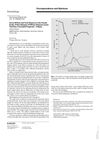 56 citations,
January 2001 in “Dermatology”
56 citations,
January 2001 in “Dermatology” Teloptosis is a key point in hair loss that could help in creating prevention-focused hair care strategies.
 51 citations,
January 2004 in “Skin Pharmacology and Physiology”
51 citations,
January 2004 in “Skin Pharmacology and Physiology” The document explains hair growth and shedding, factors affecting it, and methods to evaluate hair loss, emphasizing the importance of skin biopsy for diagnosis.
 25 citations,
August 2021 in “Irish Journal of Medical Science (1971 -)”
25 citations,
August 2021 in “Irish Journal of Medical Science (1971 -)” COVID-19 infection can significantly cause temporary hair loss.
 6 citations,
January 2018 in “PubMed”
6 citations,
January 2018 in “PubMed” Heavy metals might contribute to hair loss in Telogen Effluvium.
 4 citations,
January 2022 in “Indian Dermatology Online Journal”
4 citations,
January 2022 in “Indian Dermatology Online Journal” COVID-19 may cause temporary hair loss due to direct damage to hair follicles, but it usually gets better on its own.
 4 citations,
April 2022 in “Dermatologic Therapy”
4 citations,
April 2022 in “Dermatologic Therapy” Injecting scalp tissue micrografts is a safe and effective treatment for hair loss after COVID-19.
 3 citations,
January 2019 in “International Journal of Trichology”
3 citations,
January 2019 in “International Journal of Trichology” The balance of thiol-disulfide in women with hair loss is affected but not damaged.
 August 2024 in “International Journal of Medicine”
August 2024 in “International Journal of Medicine” COVID-19 can cause hair loss, and managing it involves counseling, diet changes, and treatments.
 6 citations,
March 2011 in “Experimental Dermatology”
6 citations,
March 2011 in “Experimental Dermatology” Too much or too little selenium in the diet can cause hair loss and graying in mice.
 81 citations,
July 2011 in “Lasers in Medical Science”
81 citations,
July 2011 in “Lasers in Medical Science” The Lexington LaserComb helped regrow hair in mice with a condition similar to human hair loss.
 40 citations,
September 2017 in “F1000Research”
40 citations,
September 2017 in “F1000Research” Oral minoxidil effectively reduces hair shedding in women with CTE, with no major side effects.
 June 2012 in “Springer eBooks”
June 2012 in “Springer eBooks” Eating disorders can cause various hair problems, and while hair loss in these disorders is linked to metabolic syndrome, treatment focuses on specific medications and lifestyle changes for the syndrome.
 April 2017 in “Journal of dermatology & cosmetology”
April 2017 in “Journal of dermatology & cosmetology” The marine protein complex, Viviscal®, was found to effectively reduce hair loss and improve hair, skin, and nails quality in women.

Thyroid problems can cause hair loss and change hair texture.
 29 citations,
January 2003 in “Dermatology”
29 citations,
January 2003 in “Dermatology” The condition called 'acute diffuse and total alopecia of the female scalp' is actually a known condition named alopecia areata incognita.
 September 2003 in “Clinics in Family Practice”
September 2003 in “Clinics in Family Practice” Different hair diseases affect people during childbearing years, with treatments ranging from medication to psychological support.
 57 citations,
March 2011 in “The American Journal of Dermatopathology”
57 citations,
March 2011 in “The American Journal of Dermatopathology” Chemotherapy can cause permanent, non-reversible hair loss similar to pattern baldness.
 32 citations,
December 2017 in “International Journal of Molecular Sciences”
32 citations,
December 2017 in “International Journal of Molecular Sciences” Low vitamin D might be linked to certain types of hair loss, and supplements could help, but more research is needed.
 31 citations,
March 2017 in “Journal of The American Academy of Dermatology”
31 citations,
March 2017 in “Journal of The American Academy of Dermatology” Some breast cancer patients developed permanent hair loss after chemotherapy and hormonal therapy, showing patterns similar to common baldness and alopecia areata.
 26 citations,
August 2018 in “American Journal of Clinical Dermatology”
26 citations,
August 2018 in “American Journal of Clinical Dermatology” Hair loss in cancer patients can be related to the cancer itself, treatment, or other conditions, and understanding it is important for diagnosis and patient care.
 23 citations,
July 1982 in “International Journal of Dermatology”
23 citations,
July 1982 in “International Journal of Dermatology” The review concludes that accurate diagnosis of different types of hair loss requires proper biopsy techniques and understanding the hair growth cycle and underlying causes.
 12 citations,
October 1996 in “Dermatologic Clinics”
12 citations,
October 1996 in “Dermatologic Clinics” A simplified method was introduced to diagnose most hair loss types by examining the patient's history and scalp, with some cases needing further tests.
 1 citations,
January 2017 in “International Journal of Dermoscopy”
1 citations,
January 2017 in “International Journal of Dermoscopy” Dermoscopy is useful for identifying and tracking different types of hair loss without scarring.
 68 citations,
May 2012 in “Annals of Oncology”
68 citations,
May 2012 in “Annals of Oncology” Some breast cancer chemotherapy can cause permanent hair loss.

COVID-19 can cause significant hair loss.
 63 citations,
March 1995 in “International Journal of Dermatology”
63 citations,
March 1995 in “International Journal of Dermatology” Some drugs can cause hair loss, and stopping these drugs often leads to hair regrowth.
 9 citations,
October 1988 in “Clinics in Dermatology”
9 citations,
October 1988 in “Clinics in Dermatology” Hair loss is caused by genetics and hormones, diagnosed through examination and biopsy, and treated with medications or surgery.
 1 citations,
October 2013 in “Expert Review of Dermatology”
1 citations,
October 2013 in “Expert Review of Dermatology” Diagnosing alopecia areata is challenging and requires careful examination and various tests to distinguish it from other hair loss types.
 January 2019 in “Elsevier eBooks”
January 2019 in “Elsevier eBooks” Different hair disorders have specific treatments and outcomes, with some resolving on their own and others requiring medication or emotional support.
 October 2018 in “Vestnik dermatologii i venerologii”
October 2018 in “Vestnik dermatologii i venerologii” Certain growth factors affect hair loss in women and could be targeted for treatment.






























